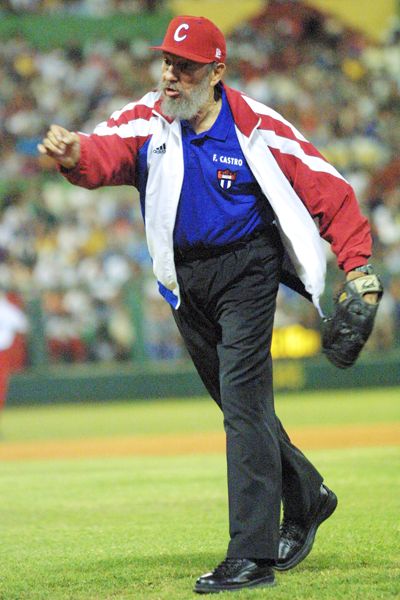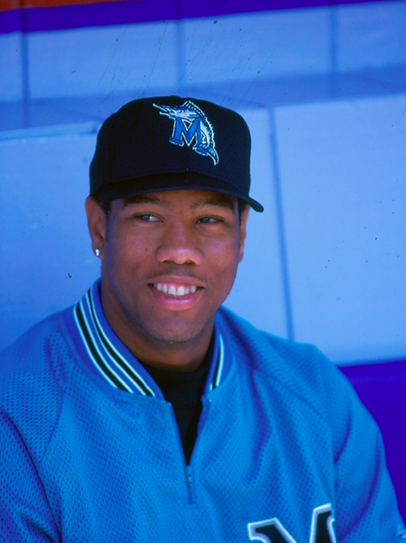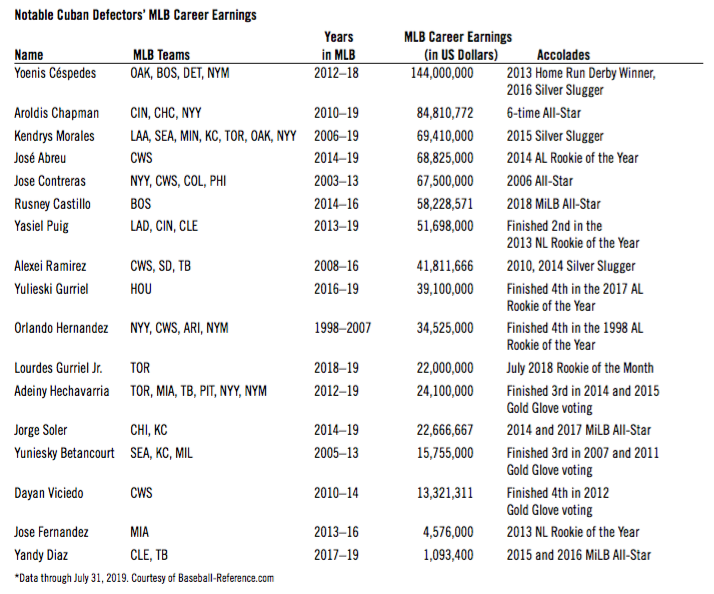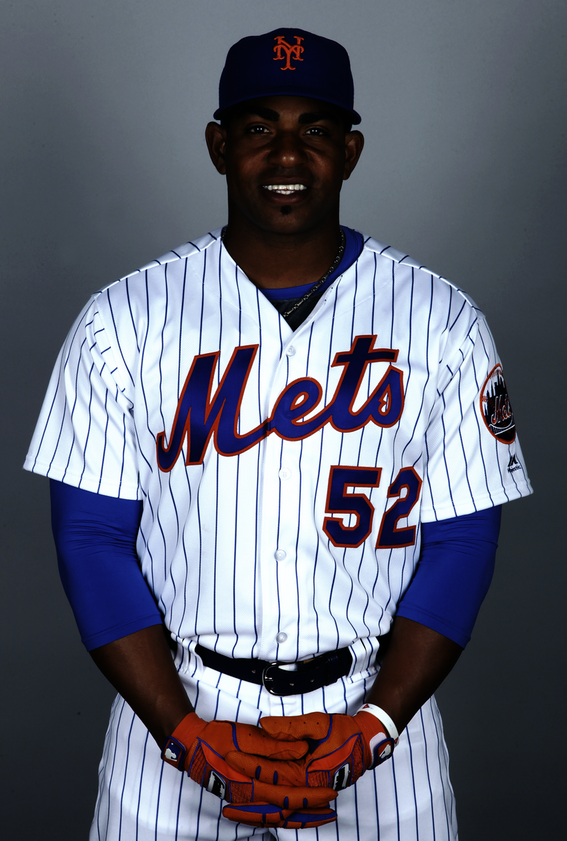Community, Defection, and equipo Cuba: Baseball under Fidel Castro, 1959–93
This article was written by Katie Krall
This article was published in Fall 2019 Baseball Research Journal
 Baseball is called America’s national pastime, but in Cuba baseball is a way of life. In the late 1890s during the war of independence, baseball unified the Cuban people in opposition to Spaniards, who looked down on the sport and preferred traditional European bullfighting. Sixty years later when Fidel Castro came to power, he knew that he needed to again coalesce the populace. After the 1959 revolution, Castro abolished professional baseball and created béisbol revolucionario. Milton Jamail writes in his book, Full Count: Inside Cuban Baseball, that el comandante en jefe thought “selling baseball players was a crude manifestation of the worst elements of capitalism, akin to slavery, and he referred to professional baseball as la pelota esclava.”1
Baseball is called America’s national pastime, but in Cuba baseball is a way of life. In the late 1890s during the war of independence, baseball unified the Cuban people in opposition to Spaniards, who looked down on the sport and preferred traditional European bullfighting. Sixty years later when Fidel Castro came to power, he knew that he needed to again coalesce the populace. After the 1959 revolution, Castro abolished professional baseball and created béisbol revolucionario. Milton Jamail writes in his book, Full Count: Inside Cuban Baseball, that el comandante en jefe thought “selling baseball players was a crude manifestation of the worst elements of capitalism, akin to slavery, and he referred to professional baseball as la pelota esclava.”1
Traditionally, ballplayers would travel to Havana during the offseason to play winter ball—not just major league players, but also Negro Leaguers, many of whom played in Latin America before Jackie Robinson broke the color barrier in 1947 because of the more equitable treatment they received outside of the United States. However, Castro decreed that foreign imports were no longer allowed on any of the island’s diamonds.
For over four decades of this period of self-imposed isolation, the Cuban national baseball team, equipo Cuba, went nearly undefeated in international tournaments. Cuban baseball players competed in rickety stadiums that lacked any of the amenities associated with modern venues, but the crowds were large and loud every night. “Sports activities offered the citizen a means of individual expression, a way to compete, to achieve, and to accomplish something. In a non-capitalist, anti-individualistic society, such an opportunity was rare.”2
Castro exploited the incredible play of equipo Cuba as evidence of the socialist regime’s success and as a source of national pride. The creation of development academies for amateur athletes tethered baseball players to the state and made amateur baseball in Cuba a government-run operation.
Based on a cost-benefit analysis of the value of defection, I argue that strong familial and community ties prevented Cuban players from abandoning the national team after the 1959 revolution. However, after the fall of the Soviet Union in 1991 and legalization of the possession of the US dollar two years later, prominent players began defecting to the Major Leagues as those bonds started to break. A dearth of economic opportunities on the island triggered widespread player disillusionment with party ideology. Therefore, players such as Yoenis Céspedes, Aroldis Chapman, and Yasiel Puig who, had they been born decades prior, would have remained in Cuba, analyzed the incentives of defection and decided that exponentially higher salaries in MLB were worth the price of leaving the island.
My study examines the time between Castro’s takeover and the legalization of the US dollar on the island in 1993. The revolution altered how players were developed and subsequently indoctrinated with the socialist creed. When René Arocha, a pitcher on equipo Cuba, defected in 1991, he ushered in a new era of Cuban baseball in the US, but I have found that this moment alone was not enough to encourage a widespread exodus of baseball players. Instead, it was a combination of limited economic freedoms caused by the dissolution of the Soviet Union (and their financial support to the island) that led to the proliferation of equipo Cuba players filling spots on Major League rosters. Defection “began happening in earnest after the collapse of the Soviet Union because the Cuban economy, which was in shambles already, took a further dip and the players saw that their future was bleak.”3
Despite the government establishing academies for amateur volleyball, boxing, and soccer, baseball was the most popular sport on the island and deeply ingrained in the national consciousness. Castro wanted to make baseball his own in the same way he sought to reorder healthcare and education. Juan Linz explains in his book, Totalitarian and Authoritarian Regimes, that “the destruction, or at least decisive weakening of all the institutions, organizations, and interest groups existing before a new elite takes political power and organizes its own political structures is one of the distinguishing characteristics of totalitarian systems.”4 Castro stripped the game of its association with the United States and ushered in a new era—one completely under his control. Cuban baseball historian Roberto Gonzalez Echevarria notes that Castro took “a tremendous tradition, one that all Cubans agree is the essence of their identity, of being Cuban, and fused it with a state structure which supports the playing of the game, that creates the young ballplayers, finds them, uses them and develops them.”5
The timeless rules of baseball were unaltered so that when equipo Cuba played in international competitions they would not be at a disadvantage, but Castro eliminated many of the commercial features of sports. Even in 1959, corporate sponsors had taken over most major-league ballparks with Coca-Cola signs dotting the outfield walls from New York to Los Angeles. Castro, in his crusade against all things capitalist, saw to it there were “no paid advertisements in Cuban ballparks, just political slogans.”6 Instead of team owners, the Communist Party operated all organizations and stadiums throughout the island. Baseball therefore became not only a form of recreation, but also a means through which to raise the next generation of party loyalists.
 Castro implemented a system where ballplayers were developed locally, in a similar fashion to the state-sponsored sports programs of the Soviet Union. Every two to three years, depending on their abilities, young athletes were promoted to different academy levels to foster their talents. Parents were encouraged to place particularly gifted children in special sports schools for early training at the regime’s expense. Youngsters with potential were thus offered luxuries: better food, comfortable living quarters, modern facilities, opportunities to travel and compete, and even special bonuses such as a car or pocket money.7
Castro implemented a system where ballplayers were developed locally, in a similar fashion to the state-sponsored sports programs of the Soviet Union. Every two to three years, depending on their abilities, young athletes were promoted to different academy levels to foster their talents. Parents were encouraged to place particularly gifted children in special sports schools for early training at the regime’s expense. Youngsters with potential were thus offered luxuries: better food, comfortable living quarters, modern facilities, opportunities to travel and compete, and even special bonuses such as a car or pocket money.7
The government had a strong influence over amateur Cuban athletes at a very impressionable age. While in the US a Little Leaguer might dream of playing shortstop for the Yankees, in Cuba there was no higher honor than being named to the national team. When players were between thirteen and sixteen, the top athletes attended Escuelas de Iniciación Deportiva (EIDE). At these sports initiation schools, students divided their day between the field and classroom. Competition was incredibly fierce at each level. “Those baseball players who show exceptional promise at the EIDEs are sent on to the Escuela Superior de Perfeccionamiento Atlético (ESPA). There is one ESPA in each of Cuba’s fourteen provinces, plus one for the city of Havana.”8 Since players attend EIDEs and ESPAs in the province where they were born, strong bonds developed between a player and his community. The state made an intentional investment in its athletes both physically and ideologically with the expected dividend someday being their high level of play in international tournaments.
Wearing a jersey with “Cuba” emblazoned across your chest as a member of the national team was a tangible representation of the state, so Castro micromanaged the officials and players of equipo Cuba. This party oversight meant that in addition to having baseball prowess, a player had to also follow doctrine and ideology as outlined by the regime. Castro expected that anyone affiliated with equipo Cuba would properly represent the island—no errors were tolerated on or off the field.
Cubans had great pride and respect for their players who seemed to embody the ideals of the revolution. Player defections caused significant grief and heartbreak to fans who viewed many athletes like sons or brothers. Sigfredo Barros, a Cuban journalist, explained that “no one in the United States taught Arrojo to throw a sinker; he was taught that here in Cuba. Or the slider to Orlando, or Livan’s 93-mph fastball, or to field balls like Ordóñez does. We taught them those things here.”9 The references to Rolando Arrojo, brothers Orlando and Livan Hernandez, and Rey Ordóñez, all of whom defected from Cuba in the 1990s, underscore the pain many Cubans felt when players abandoned the national team.
Baseball, and its accompanying values, proved an effective vehicle for Castro to advance the objectives of his new socialist order. “The sports hero exemplifies the ideal disciplined worker, loyal revolutionary, and obedient soldier.”10 While there were few economic or social victories the government could cite, the Olympic gold medals in Barcelona in 1992 and Atlanta in 1996 equipo Cuba won seemed to vindicate the methods of the Communist Party. Castro merged sport with nationalism and ensured that the game advanced his authoritarian mission.
In a society of alleged equality, one man stood above all others. Every aspect of the Cuban regime, and baseball in particular, was meant to glorify the prowess of Fidel Castro. On the rare occasions when he spoke to American journalists, he cited multiple occasions when he was scouted as a pitcher by major league teams and even offered a contract. While most of these stories have been debunked, the narrative he constructed of himself as a legendary baseball player speaks to the importance of the game in earning the respect and devotion of Cuban citizens.
These four decades of spectacular play by equipo Cuba and backing by the Soviet Union resulted in a golden era for Cuban baseball. While Cuban players didn’t enjoy the same material comforts as their counterparts in the United States, for some the admiration and love communities lavished on them overcame the financial gap. Carlos Rodriguez Acosta, the current Commissioner of Cuban Baseball, explained that “almost all of our athletes, not only in baseball, but in all of our sports, are all very aware of what they represent and why they’re so great. They’re great because they’ve benefited from a free education system, because sport is the right of the people, because they don’t rely on sport to make a living, because health care is free and because they are given everything.”11 Rodriguez Acosta’s rhetoric was a hallmark of the curriculum each player learned at all levels of the state-sponsored development academies.
Just as they were instructed in how to properly throw a curveball or steal second base, party ideology was taught to Cuban baseball players. Ronald Wintrobe explains in his essay “The Tinpot and the Totalitarian: An Economic Theory of Dictatorship” that “the Party encourages and directs loyalty by maintaining and propagandizing an exclusive ideology that promotes the Party’s goals and helps establish and codify its reputation.”12 Every victory against the US was not just a win for equipo Cuba, but a triumph over capitalism and the Western world order. For a time, there were many Cuban athletes who believed unconditionally in Castro and the socialist state.
Omar Linares was one of those players and arguably the most talented third baseman in Cuban baseball history. He was the “poster boy for the deep-seated loyalty of the great majority of late-twentieth century Cuban diamond stars.”13 For over two decades he trumpeted the benefits of the Cuban baseball system, always remembering to pay homage to the state and development academies that taught him the game. “Linares often described his decision to remain in Cuba, making the equivalent of $20 a month plus a few perks not available to the average Cuban, as based upon the gains he and his family made through the revolution.”14
Since Linares was frequently approached by major-league teams to play in the US and could have left the island, albeit under covert methods, on multiple occasions, Linares’s cost-benefit analysis at the time favored remaining in Cuba. While the degree of his support of the system may have been amplified to serve the goals of the state, his comments to foreign journalists and Granma, Cuba’s official government newspaper, seem to be authentic representations of his feelings. After equipo Cuba beat the Baltimore Orioles in 1999 in an exhibition game, Linares proclaimed, “Commander-in-chief, the mission you gave us has been completed,” and he ended his battle report to the comandante en jefe with the words “Socialismo o muerte! (Socialism or death!) Patria o muerte! (Homeland or death!) Venceremos! (We will triumph!)”15 Linares, like other amateur Cuban baseball players, received no financial incentives for winning a championship. Nevertheless, he played with a tenacity and joy that transcended economic concerns.
After the fall of the Soviet Union, however, poverty became so dire that all Cubans, athletes especially, could no longer ignore the cost of remaining in a socialist state. The período especial (special period), which was the excuse used for broken machinery and lack of goods and services, disproportionately impacted baseball players. While some Cubans sold cigars to tourists or took on side work to secure extra cash, members of equipo Cuba were closely monitored by the party and unable to engage in any illicit activities. As “Cuba’s domestic GDP collapsed by an estimated 37 per cent, and 50 per cent of the economy lost purchasing power,”16 leaving the island was less of a political stance and more of a means of survival. In addition, “the years of productivity for an athlete, for anyone who depends on his or her body or performance is limited. So, the urgency to be able to use that talent is much greater than in the case of someone who has a much more intellectual type of job. These players felt that urgency after the Cuban economy dipped, and there was a sense of despair, now communism was a religion without a Rome or a Jerusalem.”17
Beginning in 1991, Cuban baseball players began to fully understand that other opportunities existed only ninety miles away. Once removed from the watchful eye of the party, Cuban defectors became more comfortable voicing their critiques of the government. Jorge Diaz, a defector and former member of equipo Cuba, explained, “in Cuba we won three straight championships. They would treat you to a beer, they’d pay for a night at the hotel with your family, but nothing more. One would ask for things that one needed and they would deceive you.”18 While national pride and love of country were ties that had kept players on the island, the tether snapped when baseball players were no longer able to scrape by on meager government handouts.
Baseball players’ repudiation embarrassed the Cuban government. Castro considered members of equipo Cuba to be the face of the revolution. When they turned their backs on the country that raised them, it suggested to the Cuban people that the party could be challenged. As defections have become far more common today (although the risks remain with tales of danger and bravery thoroughly outlined by the US media), the strength of the national team and its grip on amateur players has waned. Instead of staying in Cuba, top players have sought wealth and fame in Major League Baseball.
Notable Cuban Defectors’ MLB Career Earnings

(Click image to enlarge)
Inextricably linked to baseball defectors is the relationship between the United States and Cuba. “It has long been a part of American media policy to cheer on the Cuban baseball defector as a political and ideological story.”19 In this charged climate, there is more at stake than a championship or standing on the Olympic podium. Robert Huish explains in his essay, “The (Soft) Power of Sport: The Comprehensive and Contradictory Strategies of Cuba’s Sport-Based Internationalism,” that “Cuban sport should be understood as part of a broader development agenda, as well as an opportunity or avenue through which Cuba pursues its national interests.”20 When players leave the island, they are fighting party ideology and therefore constitute a threat to the regime.
The Cuban state baseball apparatus is faced with the dual problem of “players with little possibility of advancement and the unwillingness to provide the necessary economic stimulus for players to remain in the country.”21 While during the Mariel exodus thousands of Cubans left the island, it was the players on equipo Cuba who were disproportionately ostracized. “Those who migrated from Cuba to the United States were labeled gusanos (worms or traitors) by the Cuban revolutionary authorities and by many compatriots who remained on the island.”22
 While great wealth and fame can await some talented baseball players who leave Cuba, it is still a harrowing journey that is difficult to execute alone. Joe Cubas has represented a number of Cuban defectors and is the mastermind behind the now famous “Joe Cubas Plan” which has become the blueprint for the entire baseball smuggling industry. After ferrying players off the island and establishing residency in a third country (thus circumventing regulations for MLB free agents and the embargo), he encourages high-priced bidding wars among the 30 major league clubs.23
While great wealth and fame can await some talented baseball players who leave Cuba, it is still a harrowing journey that is difficult to execute alone. Joe Cubas has represented a number of Cuban defectors and is the mastermind behind the now famous “Joe Cubas Plan” which has become the blueprint for the entire baseball smuggling industry. After ferrying players off the island and establishing residency in a third country (thus circumventing regulations for MLB free agents and the embargo), he encourages high-priced bidding wars among the 30 major league clubs.23
While Cuba under Castro exhibited many of the textbook characteristics of authoritarian regimes and baseball was used by the state as a means through which to promote ideology, it is clear that defection is linked to economic considerations. After years of dynastic success on the world stage, the death blow to equipo Cuba was not due to a lower quality of play on the field or poor coaching but rather the political climate. The Special Period changed the variables players weighed when deciding to defect with the promise of financial security and a better quality of life trumping any debt they may have felt to their homeland.
Despite the many former equipo Cuba stars who now play for storied MLB franchises such as the Yankees, Red Sox, and Dodgers, the Cuban government refuses to acknowledge their achievements or forgive their transgressions. There is a fear that normalizing conversations about teams in the United States will encourage defection. Under this mentality, if the Cuban people were to know of defectors’ successes, it would undermine the socialist mission. Celebrating players in MLB, a business that adheres to the rules of the free market, would be tantamount to touting the benefits of capitalism.
The reign of amateur Cuban baseball from 1959 until the early 1990s is unlikely ever to be seen again. Today, “playing conditions, fan enthusiasm, and ballplayer morale have sunk to all-time lows. The national team heroes are no longer the country’s biggest news.”24 Names such as Omar Linares become the subject of debate among an older generation as the next wave of Cuban athletes set their eyes on defecting to join the major leagues. While players in Cuba’s top baseball league still only earn a few hundred dollars a month, MLB stars such as Yuli Gurriel and José Abreu rake in tens of millions of dollars over their careers.25 These major league standouts who, in a different era, under Fidel Castro, would have given anything to be a member of equipo Cuba now find themselves very far away from the island that first introduced them to the game.
After planning the World Series Trophy Tour for the Chicago Cubs in 2016, KATIE KRALL received a SABR membership from her twin sister as a present for her work with the team. In February 2018, she was selected as part of the inaugural class of the Major League Baseball (MLB) Diversity Fellowship. The program is designed to promote women and people of color into front office executive roles. Krall works in the League Economics & Operations department at the Commissioner’s Office in New York City and assists with player transactions, contracts, on-field discipline, and salary arbitration.
Notes
1. Milton H. Jamail, Full Count: Inside Cuban Baseball, Southern Illinois University Press, 2000, 29.
2. Julie Marie Bunck, “The Politics of Sports in Revolutionary Cuba,” Cuban Studies, Vol. 20, 1990, 127.
3. “Stealing Home: The Case of Contemporary Cuban Baseball.” http://www.pbs.org/stealinghome/debate/defections.html
4. Juan J. Linz, Totalitarian and Authoritarian Regimes, Rienner, 2009, 68.
5. “Stealing Home.”
6. Jamail, 110.
7. Bunck, 120–21.
8. Jamail, 39.
9. “Stealing Home.”
10. Bunck, 119.
11. “Stealing Home.”
12. Ronald Wintrobe, “The Tinpot and the Totalitarian: An Economic Theory of Dictatorship,” American Political Science Review, 1990, 867.
13. Peter C. Bjarkman, “Omar Linares,” Society for American Baseball Research, 2016. http://sabr.org/bioproj/person/ab3866fa.
14. Jamail, 32.
15. Jamail, 142.
16. Robert Huish, et al, “The (Soft) Power of Sport: The Comprehensive and Contradictory Strategies of Cuba’s Sport-Based Internationalism,” International Journal of Cuban Studies, Vol. 5 #1, 2013, 31.
17. “Stealing Home.”
18. “Stealing Home.”
19. Peter C. Bjarkman, Cuba’s Baseball Defectors: The Inside Story, Rowman & Littlefield, 2017, 54.
20. Huish, et al., 27.
21. Jamail, 7.
22. “Stealing Home.”
23. Bjarkman, Cuba’s Baseball Defectors, 159.
24. Bjarkman, Cuba’s Baseball Defectors, 199.
25. Mercer, Greg. “The Baseball Stars Who Ignore MLB to Stay Loyal to Cuba…and Canada.” The Guardian, Guardian News and Media, 9 Aug. 2018, http://www.theguardian.com/sport/2018/aug/09/the-baseball-stars-who-ignore-mlb-to-stay-loyal-to-cuba-and-canada.


